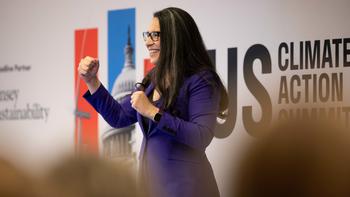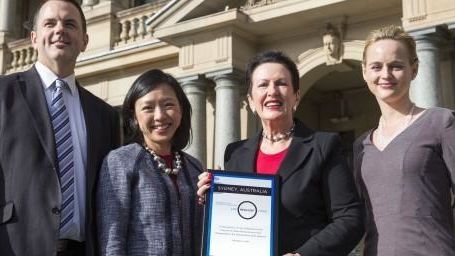
Southern Cross University has achieved its best ever result in the QS World University Rankings, emerging in the top 50% of global institutions.
These rankings, established in 2004 and produced by global higher education consultancy QS Quacquarelli Symonds, list the world’s top universities in 100 locations. The results account for the distribution and performance of 16.4 million academic papers and the 117.8 million citations received by those papers.
The 701-750 ranking for Southern Cross is an outstanding result for a non-metropolitan Australian university competing against 1422 universities globally. Since breaking into the QS World University Rankings (WUR) for the first time in 2018, at the 801-1000 tier, Southern Cross has moved up twice.
The Citations per Faculty metric has jumped from 474 to 393, demonstrating the University’s scholarly impact and reputation for research excellence is growing.
The University’s ability to attract high quality international staff and students is demonstrated by the strong International Students indicator (120).
“Our purpose and focus are to achieve world standard excellence and deliver the benefit of that to the regions we serve through our work in education and research. This is a journey that unfolds over many years so to see some affirmation of our approach through a continued rise in our global ranking is pleasing,” Professor Tyrone Carlin, Vice Chancellor of Southern Cross University, said.
“We are blessed with an incredibly talented and dedicated group of colleagues. As we work together on building highly distinctive educational programs and research that delivers positive impact, it is very motivating to see the ongoing growth of our global reputation.”
Earlier this year, Southern Cross University maintained its global standing for Agriculture and Forestry in the 2022 QS WUR by Subject evaluation. The University’s Agriculture and Forestry subject area ranked in the 301-350 band.
“Rankings are an important indicator of our reputation internationally, and research metrics are critical to achieving success in the rankings,” said Professor Mary Spongberg, Deputy Vice Chancellor (Research).
“This improvement not only reflects the quality of our researchers, who have continued to produce excellent results in spite of the many challenges that have been posed in recent times, but also the growing sense that our strategy to make research everybody’s business at Southern Cross is bearing fruit.”
Go to QS World University Rankings 2023 at www.topuniversities.com
Southern Cross University research highlights
Plant Science supporting growers produce healthy crops
Southern Cross University’s global standing for Agriculture and Forestry in the 2022 QS WUR by Subject evaluation is the result of some of the excellent work being undertaken by researchers such as Professor Terry Rose, Associate Professor Tobias Kretzschmar, Dr Ben Liu and Dr Mervyn Shepherd.
Their work supports the tea tree oil, coffee and macadamia production industries located in the NSW Northern Rivers and in south east Queensland and the challenges faced in production environments and quality maintenance.
At the same time, Southern Cross Plant Science is characterising collections of specialised crops such as coloured rice, mustard and hemp to enable the development of new markets that emphasise quality and health benefits.
Waste management
Southern Cross University is contributing to efforts to help solve the global waste problem. Professor Dirk Erler is leading an ARC Linkage Project to transform meat residue into agricultural soil improver.
Catchments, coasts and communities
Southern Cross University researchers are supporting local communities following the unprecedented Northern Rivers flood events earlier this year. Led by Professor Bradley Eyre, an ARC-funded research project developing a data set for metabolism and greenhouse gas production in intermittent streams will now include information the two back-to-back record-breaking flood events in February and March 2022.
Associate Professor Christian Sanders is auditing mangrove wetlands acting as environmental cleansers for inclusion in national policy frameworks for CO2 emission reduction schemes, while Professor Isaac Santos is modelling groundwater seepage to show its influence on water quality in estuaries and the coastal ocean. Professor Brendan Kelaher led multiple research projects that informed the NSW Government’s shark management strategy.
Professor Damien Maher is exploring the role trees play in releasing methane from soils to the atmosphere, and Professor Ed Burton is unravelling hexavalent chromium formation (including the highly toxic and cancerous chromium-6) in fire-impacted soil
Health and wellbeing
Professor Anne Graham, Director of the Centre for Children and Young People, has been working on projects with communities directly impacted by the floods. Her ground-breaking evidence-based program Stormbirds, created in partnership with the MacKillop Institute, supports children and young people adapt to the impact of natural disasters, and has been used previously following the Bushfires and the Christchurch earthquake. Professor Graham is in the process of delivering this program across 12 of the most flood-impacted schools. Up to 7000 children will benefit from this program, and 175 schools will have the opportunity for staff to be trained to deliver the program and provide ongoing support.
Our ranking success also reflects the success of the Faculty of Health‘s strategy to increase their research capacity and capabilities and achieve greater international impact. A focus on publications in prestigious and international journals has seen an increase in impact with researchers at the National Centre for Naturopathic Medicine and in fields such as mental health, nursing and green exercise achieve high citations rates for their disciplines.
Reefs and oceans
Multiple Southern Cross researchers are providing expertise to the Reef Restoration and Adaption Program (RRAP) to develop an innovative suite of safe, acceptable interventions to help the Great Barrier Reef resist, adapt to, and recover from the impacts of climate change. Two projects in particular are making waves around the globe: Cloud Brightening and Coral Larval Restoration (aka Coral IVF).
Led by Dr Daniel Harrison, the Cloud Brightening field trials are producing exciting preliminary results. Cloud Brightening enhances marine clouds over the reef by helping them to reflect solar energy away from the Reef – in turn helping protect coral from bleaching – by spraying microscopic seawater particles into the air.
Distinguished Professor Peter Harrison has successfully used his innovative Coral Larval Restoration technique to produce the Great Barrier Reef’s first breeding population on depleted reef sections at Heron Island.
A new frog species discovery
Amphibian specialist Dr David Newell has helped uncover a new species of mountain frog in the Gondwana rainforests at the NSW-QLD border. Philoria knowlesi breeds in spring and early summer, in small bogs, seepages and banks of headwater streams. During mating season, the males create a small breeding chamber in wet areas and tadpoles develop entirely within this chamber. There are currently seven known species of mountain frog in Australia, six of which are found only in the Gondwana rainforest area.






